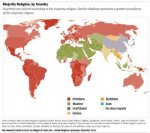Again that simply isn't the case, Bhuddism in the east is done a lot by poor people, who don't meditate, just follow a guru, or go to a temple or whatever, not all Bhuddism is meditative Bhuddism.
true.
Sounds like the US, almost (2 parties, both buisiness, oligarchy, corporate bureaucracy, corporations run most areas of life), point being socialism requires at least the pretense that the economy is being run communally, or socially, rather than private and for profit, China doesn't even have that pretense anymore.
Yes and no. Those 2 parties still need votes to get into office. And the whole thing is very different. Don't compare them. China is a new kind of communism, XXIth century communism if you will. Soon enough it will be looked at the way communism and fascism were looked at in the XXth century. A viable alternative to democracy. But they weren't back then... and this isn't now.
Jim Wallis, and evangelical is a wonderful guy, you have many evangelicals that are great, it's such a shame that they get drowned out though, evangelicals were at the forfront of the abolitionist movement, in the labor movement and so on, yet nowerdays all you hear are the Pat Robertson types, and liberals talk about "evangelicals" (as I used to as well, before I encountered actual evangelicals) as the ones they see on TV, it's a shame.
Christianity DOES offer salvation in this life, of a sort, salvation from the fleshly materialistic way of thinking, salvation from fear and from hatred and violent thinking and so on.
I just don't buy your analysis of Christianity in China, the urban middle class have experienced massiave improvements in their lives, huge wealth has been created, oppression in China for them is almost non existant, I personally think that Christianity in China is growing due to the message itself and the fact that it's new, I don't think socio-political implications are important, I think ANYWHERE free christianity (non institutionalized) appears, it will grow. It isn't the factory workers becoming christians, its the lawers, the professionals, the petty borgouise and so on.
Islam is also mostly about the after life, and I think Christianity is also very much about this life in the sense of Matthew 25 or Matthew 5, the church, and so on, but it's just that Christianity doesn't expect reward in this life (or really anylife, since works don't get us anything extra). Also I don't think the ethic of "you can be a banker and just give to chairty and say prayers and forget your sins," the scriptures say in all you do do it for the glory of God.
eace

